Automotive & Diesel Degree Program (62 Credit Hours)
Automotive & Diesel Technology, 64 weeks
The objective of the Automotive & Diesel Technology program is to train students for positions in the automotive field as well as to train students to pass professional certification examinations. Students should expect to learn to comply with local, state and federal laws pertaining to their field. The program will cover the the fundamentals of both automotive and diesel vehicles, both foreign and domestic. Students will gain knowledge in many automotive areas including automobiles, trucks, gasoline and diesel engine repair, including marine inboard engines and stationary engines, as well as learning diagnostic strategy in related areas. The ultimate goal of the program when combined with experience in the field is to become a master automotive technician. This program will include hands on and classroom training and require an internship in the field in order to complete the program. The program also includes general education work that must be completed in order to graduate.
The program should take about 64 weeks and the total cost including all books, materials, and up to 10 ASE certification exams, is $22,500.00 $18,100. Successful completion of this program will confer an Associate of Applied Science in Automotive & Diesel Technology.
This course is an introduction to the field of automotive, it will cover shop safety, fuels, lubricants, fasteners and the use of tools and equipment including hydraulic jacks and lifts. Additionally students will be instructed to differentiate between major automobile systems and training will be provided to perform minor diagnostic and service procedures.
In this course students will learn the basic operating principles of mechanical and hydraulic brakes, they will learn how to service both disc and drum systems. In addition students will learn the operation of master cylinders, brake booster and they will learn the proper procedures for bleeding brake systems as well as the fundamentals of ABS.
In this course students will learn the basic operating suspension principles of a vehicle as well as the mechanical and power steering systems and other components. Students will learn how to safely lift and work on a vehicle’s suspension system.
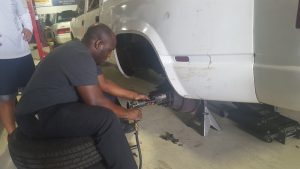
In this course students will learn the inner workings of manual drive line components and transfer cases; they will learn the operation of the clutch system and will be able to RR a manual transmission with confidence. Students will also learn how to inspect and service differentials. In this course transmission will be fully disassembled, inspected and reassembled according to the manufacturer’s guidelines. Students will learn shop and safety procedures, diagnostics skills, and how to measure and inspect drive line components.
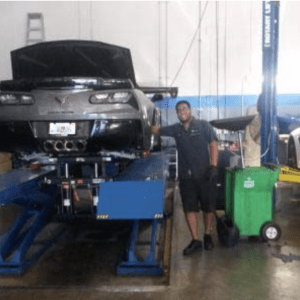
In this course students will learn the basic operating principles of the engine. Students will learn the procedures for diagnosing mechanical engine problems, the underlying causes of engine problems and the methods for repairing them. The class will disassemble and reassemble complete, running engines. The engines will be fully disassembled and inspected, the gaskets and seals will be replaced, and the engines will be fully assembled according to the manufacturer’s guidelines. Upon reassembly the engine will be run and tested. Students will learn shop procedures, safety procedures, diagnostics skills, and how to measure and inspect an engine. Students will learn to service engines and gaskets and to repair cooling systems.
In this course students will learn the basic principles of electricity. They will learn shorts, opens and other faults and they will learn how to diagnose faults and problems. They will learn to use a multimeter, test light and other electrical equipment, they will learn to test starters and batteries
The automotive internship is critical for students, while having laboratory simulation is valuable nothing compares to real world hands on experience. Staff will assist students in securing employment in both dealer and private shop environments during or subsequent to completion of the other courses in the program. Students will be required to have a minimum of 20 days of verified employment with at least 48 hours on the job in order to satisfy this requirement.
In this course students will learn to diagnose, overhaul, remove and replace an automatic transmission or transaxle. Students will learn how the automatic transmission works, how to properly service automatic transmissions, and how to diagnose and repair torque converter related concerns. Additionally students will learn the operational characteristics and be able to diagnose a continuously variable transmission.
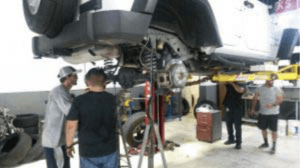
Students working on a live differential job.
This course will delve further into the operation and repair of engines. It will cover non-keyed engines, variable camshaft actuators, variable valve timing as well as advanced timing components and systems. Furthermore it will explore the operation of diesel engines and their various fuel systems including HEUI, EUI, PLN, direct injection and HPCR as well as the related components.
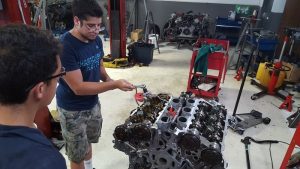
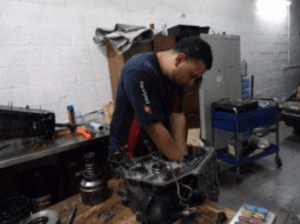
In this course students will learn how the electrical system operates, they will learn to inspect, diagnose and repair electrical systems, they will learn to read wiring diagrams and apply that knowledge on vehicles.
In this course students will learn about heating and air conditioning components, their locations and operation, as well as how to diagnose and repair those systems. Students will also learn how to comply with personal and environmental safety practices associated with clothing; eye protection; hand tools; power equipment; proper ventilation; and the handling, storage, and disposal of chemicals/materials in accordance with local, state, and federal safety and environmental regulations.
In this course students will learn the operation of ignition systems, they will learn how to diagnose ignition systems and perform ignition maintenance and repair. Areas include ignition coils, spark plugs and ignition cables as well as distributors and trigger devices. Student will also learn to diagnose and repair diesel glow plugs and preheater systems.
In this course students will learn the operational characteristics of the fuel system. Students will learn the operation of emission systems, turbo chargers, blowers and performance systems. They will understand the fundamentals of fuel injection systems, be able to diagnose and repair fuel injectors, learn to how to test and repair ECU related problems, learn to diagnose and repair evaporative emissions related problems, learn how to diagnose and test load sensors and learn how to diagnose and test oxygen sensors.
This course will continue to explore gasoline fuel systems and will further explore diesel fuel emission systems. In addition to these emissions systems students will also examine alternative vehicle
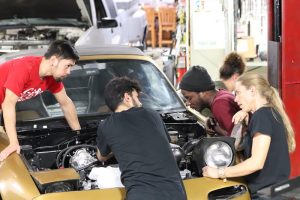
The course focuses on written communication and critical thinking, with emphasis on building logical arguments and research skills through reading, writing and discussion. Students will be exposed to a variety of materials including essays and articles and will compose papers that are organized, logically supported, clear and concise.
The course examines the history of American society from the period following the Reconstruction up to modern day. It will have a specific emphasis on the impact of diesel and internal combustion engines, electricity and related topics. Some areas that will be covered include the Industrial Revolution, Unions, the Pullman Car Company, Henry Ford and the Ford Motor Company, Nikola Tesla and Thomas Edison, technological innovation as a result of the World Wars, the Interstate Highway System as well as the long lasting environmental impact of the automobile.
The course will examine an eclectic group of authors and literary styles. Selected works in the course may be drawn from short stories, poetry, plays, essays and novels, both fiction and non fiction, ancient and modern. Students will engage in literary analysis of the selected materials on an individual basis and as a forum.
This course will explore the basic principles of physics as they specifically relate to experiences in day to day life. Core concepts include mechanics and electricity and magnetism. The aim for this course is to provide students with a foundation for better understanding the physical world around us.
This course covers the mathematics most frequently utilized while working in the automotive field. Areas of study include: systematic counting, number theory, statistics, probability and distributions, logic, sets and geometry.